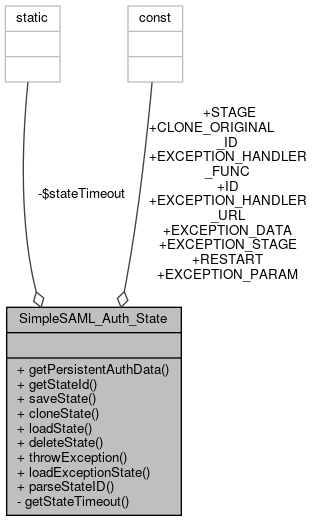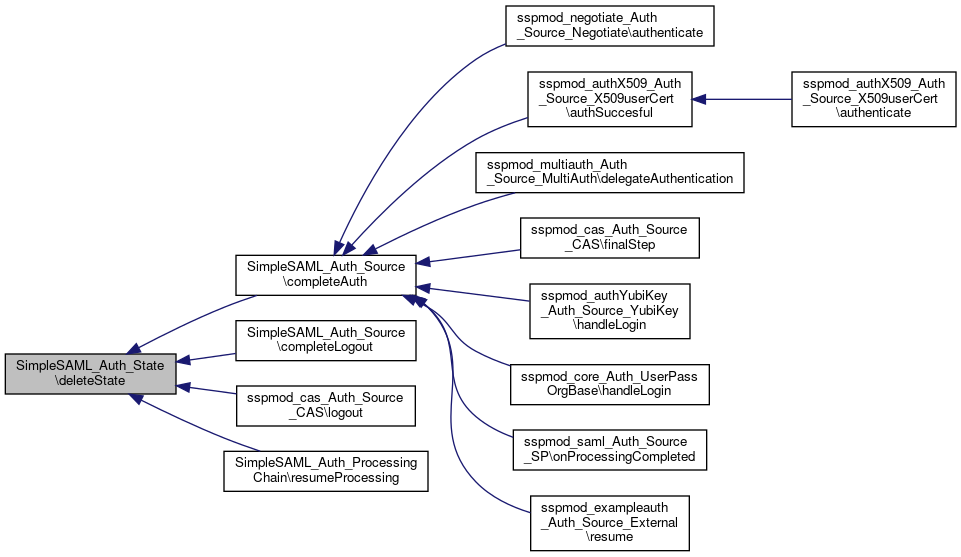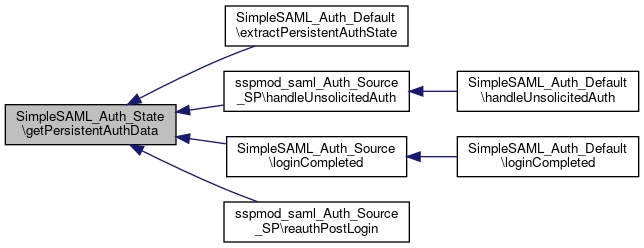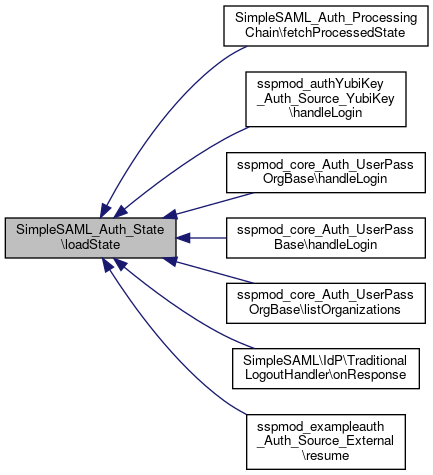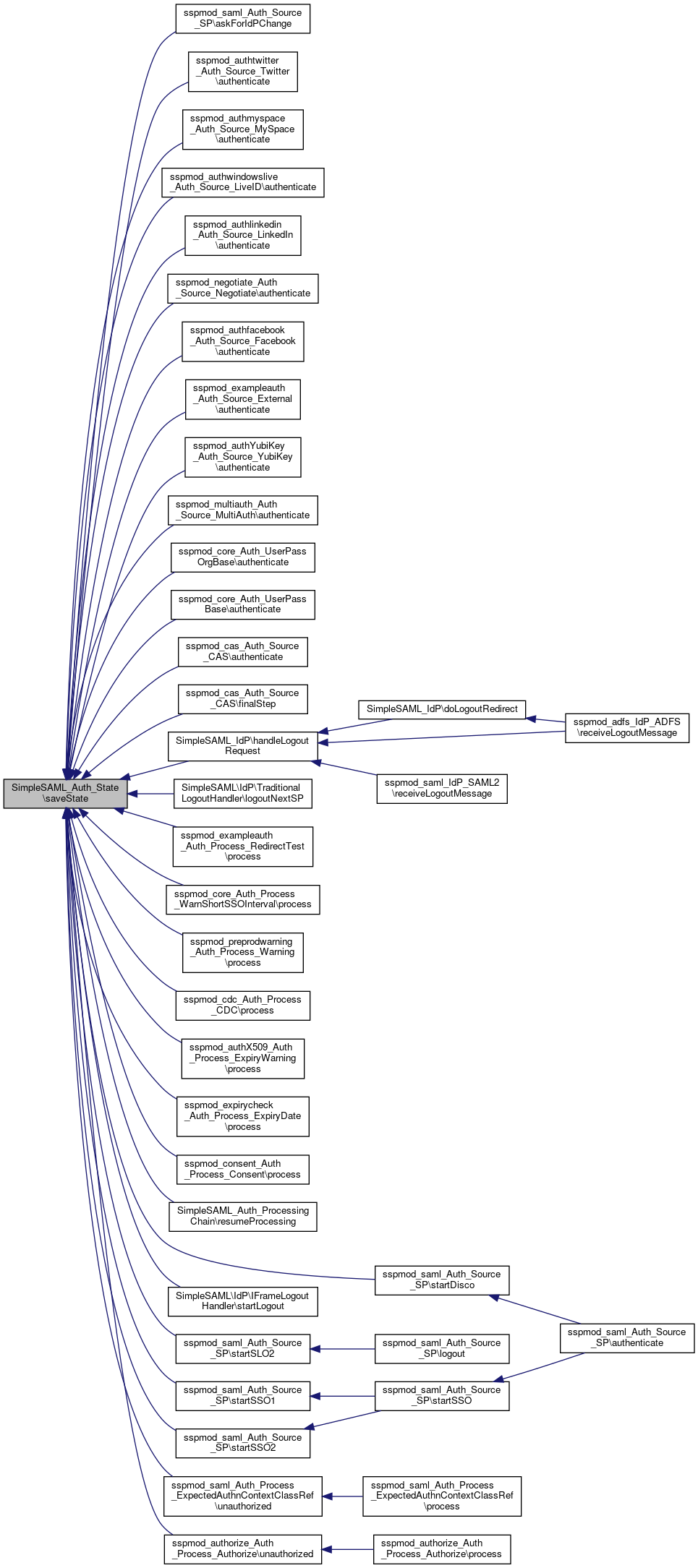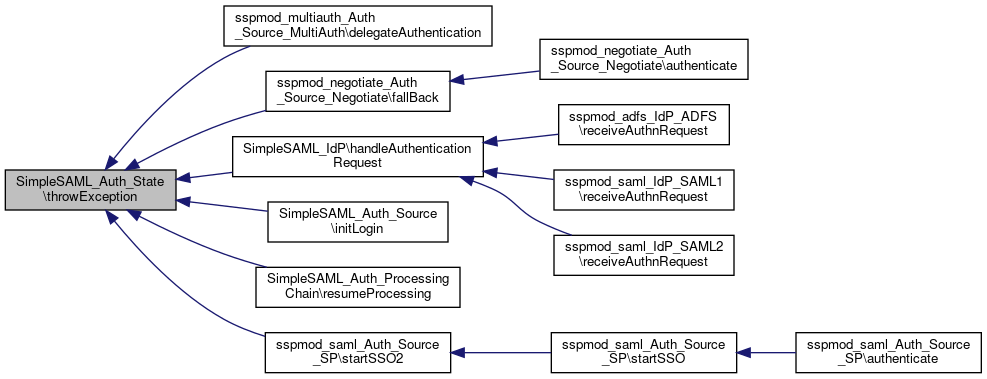 Collaboration diagram for SimpleSAML_Auth_State:
Collaboration diagram for SimpleSAML_Auth_State:Static Public Member Functions | |
| static | getPersistentAuthData (array $state) |
| Get the persistent authentication state from the state array. More... | |
| static | getStateId (&$state, $rawId=false) |
| Retrieve the ID of a state array. More... | |
| static | saveState (&$state, $stage, $rawId=false) |
| Save the state. More... | |
| static | cloneState (array $state) |
| Clone the state. More... | |
| static | loadState ($id, $stage, $allowMissing=false) |
| Retrieve saved state. More... | |
| static | deleteState (&$state) |
| Delete state. More... | |
| static | throwException ($state, SimpleSAML_Error_Exception $exception) |
| Throw exception to the state exception handler. More... | |
| static | loadExceptionState ($id=null) |
| Retrieve an exception state. More... | |
| static | parseStateID ($stateId) |
| Get the ID and (optionally) a URL embedded in a StateID, in the form 'id:url'. More... | |
Data Fields | |
| const | ID = 'SimpleSAML_Auth_State.id' |
| The index in the state array which contains the identifier. More... | |
| const | CLONE_ORIGINAL_ID = 'SimpleSAML_Auth_State.cloneOriginalId' |
| The index in the cloned state array which contains the identifier of the original state. More... | |
| const | STAGE = 'SimpleSAML_Auth_State.stage' |
| The index in the state array which contains the current stage. More... | |
| const | RESTART = 'SimpleSAML_Auth_State.restartURL' |
| The index in the state array which contains the restart URL. More... | |
| const | EXCEPTION_HANDLER_URL = 'SimpleSAML_Auth_State.exceptionURL' |
| The index in the state array which contains the exception handler URL. More... | |
| const | EXCEPTION_HANDLER_FUNC = 'SimpleSAML_Auth_State.exceptionFunc' |
| The index in the state array which contains the exception handler function. More... | |
| const | EXCEPTION_DATA = 'SimpleSAML_Auth_State.exceptionData' |
| The index in the state array which contains the exception data. More... | |
| const | EXCEPTION_STAGE = 'SimpleSAML_Auth_State.exceptionStage' |
| The stage of a state with an exception. More... | |
| const | EXCEPTION_PARAM = 'SimpleSAML_Auth_State_exceptionId' |
| The URL parameter which contains the exception state id. More... | |
Static Private Member Functions | |
| static | getStateTimeout () |
| Retrieve state timeout. More... | |
Static Private Attributes | |
| static | $stateTimeout = null |
| State timeout. More... | |
Detailed Description
Member Function Documentation
◆ cloneState()
|
static |
Clone the state.
This function clones and returns the new cloned state.
- Parameters
-
array $state The original request state.
- Returns
- array Cloned state data.
Definition at line 226 of file State.php.
References $state, CLONE_ORIGINAL_ID, SimpleSAML\Logger\debug(), and ID.
 Here is the call graph for this function:
Here is the call graph for this function:◆ deleteState()
|
static |
Delete state.
This function deletes the given state to prevent the user from reusing it later.
- Parameters
-
array &$state The state which should be deleted.
Definition at line 319 of file State.php.
Referenced by SimpleSAML_Auth_Source\completeAuth(), SimpleSAML_Auth_Source\completeLogout(), sspmod_cas_Auth_Source_CAS\logout(), and SimpleSAML_Auth_ProcessingChain\resumeProcessing().
 Here is the caller graph for this function:
Here is the caller graph for this function:◆ getPersistentAuthData()
|
static |
Get the persistent authentication state from the state array.
- Parameters
-
array $state The state array to analyze.
- Returns
- array The persistent authentication state.
Definition at line 103 of file State.php.
Referenced by SimpleSAML_Auth_Default\extractPersistentAuthState(), sspmod_saml_Auth_Source_SP\handleUnsolicitedAuth(), SimpleSAML_Auth_Source\loginCompleted(), and sspmod_saml_Auth_Source_SP\reauthPostLogin().
 Here is the caller graph for this function:
Here is the caller graph for this function:◆ getStateId()
|
static |
Retrieve the ID of a state array.
Note that this function will not save the state.
- Parameters
-
array &$state The state array. bool $rawId Return a raw ID, without a restart URL. Defaults to FALSE.
- Returns
- string Identifier which can be used to retrieve the state later.
Definition at line 145 of file State.php.
References $id, $state, SimpleSAML\Utils\Random\generateID(), ID, and RESTART.
Referenced by sspmod_authlinkedin_Auth_Source_LinkedIn\authenticate(), sspmod_authfacebook_Facebook\establishCSRFTokenState(), and saveState().
 Here is the call graph for this function:
Here is the call graph for this function: Here is the caller graph for this function:
Here is the caller graph for this function:◆ getStateTimeout()
|
staticprivate |
Retrieve state timeout.
- Returns
- integer State timeout.
Definition at line 171 of file State.php.
References $globalConfig, $stateTimeout, and SimpleSAML_Configuration\getInstance().
 Here is the call graph for this function:
Here is the call graph for this function:◆ loadExceptionState()
|
static |
Retrieve an exception state.
- Parameters
-
string | NULL $id The exception id. Can be NULL, in which case it will be retrieved from the request.
- Returns
- array|NULL The state array with the exception, or NULL if no exception was thrown.
Definition at line 381 of file State.php.
References $id, $state, EXCEPTION_PARAM, and loadState().
 Here is the call graph for this function:
Here is the call graph for this function:◆ loadState()
|
static |
Retrieve saved state.
This function retrieves saved state information. If the state information has been lost, it will attempt to restart the request by calling the restart URL which is embedded in the state information. If there is no restart information available, an exception will be thrown.
- Parameters
-
string $id State identifier (with embedded restart information). string $stage The stage the state should have been saved in. bool $allowMissing Whether to allow the state to be missing.
- Exceptions
-
SimpleSAML_Error_NoState If we couldn't find the state and there's no URL defined to redirect to. Exception If the stage of the state is invalid and there's no URL defined to redirect to.
- Returns
- array|NULL State information, or null if the state is missing and $allowMissing is true.
Definition at line 259 of file State.php.
References $id, $session, $state, SimpleSAML\Logger\debug(), SimpleSAML_Session\getSessionFromRequest(), parseStateID(), SimpleSAML\Utils\HTTP\redirectUntrustedURL(), and STAGE.
Referenced by SimpleSAML_Auth_ProcessingChain\fetchProcessedState(), sspmod_authYubiKey_Auth_Source_YubiKey\handleLogin(), sspmod_core_Auth_UserPassBase\handleLogin(), sspmod_core_Auth_UserPassOrgBase\handleLogin(), sspmod_core_Auth_UserPassOrgBase\listOrganizations(), loadExceptionState(), SimpleSAML\IdP\TraditionalLogoutHandler\onResponse(), and sspmod_exampleauth_Auth_Source_External\resume().
 Here is the call graph for this function:
Here is the call graph for this function: Here is the caller graph for this function:
Here is the caller graph for this function:◆ parseStateID()
|
static |
Get the ID and (optionally) a URL embedded in a StateID, in the form 'id:url'.
- Parameters
-
string $stateId The state ID to use.
- Returns
- array A hashed array with the ID and the URL (if any), in the 'id' and 'url' keys, respectively. If there's no URL in the input parameter, NULL will be returned as the value for the 'url' key.
Definition at line 411 of file State.php.
References $id, $stateId, and $url.
Referenced by loadState(), and SimpleSAML_Utilities\parseStateID().
 Here is the caller graph for this function:
Here is the caller graph for this function:◆ saveState()
|
static |
Save the state.
This function saves the state, and returns an id which can be used to retrieve it later. It will also update the $state array with the identifier.
- Parameters
-
array &$state The login request state. string $stage The current stage in the login process. bool $rawId Return a raw ID, without a restart URL.
- Returns
- string Identifier which can be used to retrieve the state later.
Definition at line 194 of file State.php.
References $id, $session, $state, SimpleSAML\Logger\debug(), SimpleSAML_Session\getSessionFromRequest(), getStateId(), ID, and STAGE.
Referenced by sspmod_saml_Auth_Source_SP\askForIdPChange(), sspmod_authfacebook_Auth_Source_Facebook\authenticate(), sspmod_authlinkedin_Auth_Source_LinkedIn\authenticate(), sspmod_authmyspace_Auth_Source_MySpace\authenticate(), sspmod_authtwitter_Auth_Source_Twitter\authenticate(), sspmod_authwindowslive_Auth_Source_LiveID\authenticate(), sspmod_authYubiKey_Auth_Source_YubiKey\authenticate(), sspmod_cas_Auth_Source_CAS\authenticate(), sspmod_core_Auth_UserPassBase\authenticate(), sspmod_core_Auth_UserPassOrgBase\authenticate(), sspmod_exampleauth_Auth_Source_External\authenticate(), sspmod_multiauth_Auth_Source_MultiAuth\authenticate(), sspmod_negotiate_Auth_Source_Negotiate\authenticate(), sspmod_cas_Auth_Source_CAS\finalStep(), SimpleSAML_IdP\handleLogoutRequest(), SimpleSAML\IdP\TraditionalLogoutHandler\logoutNextSP(), sspmod_authX509_Auth_Process_ExpiryWarning\process(), sspmod_cdc_Auth_Process_CDC\process(), sspmod_consent_Auth_Process_Consent\process(), sspmod_core_Auth_Process_WarnShortSSOInterval\process(), sspmod_exampleauth_Auth_Process_RedirectTest\process(), sspmod_expirycheck_Auth_Process_ExpiryDate\process(), sspmod_preprodwarning_Auth_Process_Warning\process(), SimpleSAML_Auth_ProcessingChain\resumeProcessing(), sspmod_saml_Auth_Source_SP\startDisco(), SimpleSAML\IdP\IFrameLogoutHandler\startLogout(), sspmod_saml_Auth_Source_SP\startSLO2(), sspmod_saml_Auth_Source_SP\startSSO1(), sspmod_saml_Auth_Source_SP\startSSO2(), throwException(), sspmod_authorize_Auth_Process_Authorize\unauthorized(), and sspmod_saml_Auth_Process_ExpectedAuthnContextClassRef\unauthorized().
 Here is the call graph for this function:
Here is the call graph for this function: Here is the caller graph for this function:
Here is the caller graph for this function:◆ throwException()
|
static |
Throw exception to the state exception handler.
- Parameters
-
array $state The state array. SimpleSAML_Error_Exception $exception The exception.
- Exceptions
-
SimpleSAML_Error_Exception If there is no exception handler defined, it will just throw the $exception.
Definition at line 343 of file State.php.
References $id, $state, EXCEPTION_DATA, EXCEPTION_HANDLER_FUNC, SimpleSAML\Utils\HTTP\redirectTrustedURL(), and saveState().
Referenced by sspmod_multiauth_Auth_Source_MultiAuth\delegateAuthentication(), sspmod_negotiate_Auth_Source_Negotiate\fallBack(), SimpleSAML_IdP\handleAuthenticationRequest(), SimpleSAML_Auth_Source\initLogin(), SimpleSAML_Auth_ProcessingChain\resumeProcessing(), and sspmod_saml_Auth_Source_SP\startSSO2().
 Here is the call graph for this function:
Here is the call graph for this function: Here is the caller graph for this function:
Here is the caller graph for this function:Field Documentation
◆ $stateTimeout
|
staticprivate |
◆ CLONE_ORIGINAL_ID
| const SimpleSAML_Auth_State::CLONE_ORIGINAL_ID = 'SimpleSAML_Auth_State.cloneOriginalId' |
The index in the cloned state array which contains the identifier of the original state.
Definition at line 45 of file State.php.
Referenced by cloneState().
◆ EXCEPTION_DATA
| const SimpleSAML_Auth_State::EXCEPTION_DATA = 'SimpleSAML_Auth_State.exceptionData' |
The index in the state array which contains the exception data.
Definition at line 75 of file State.php.
Referenced by throwException().
◆ EXCEPTION_HANDLER_FUNC
| const SimpleSAML_Auth_State::EXCEPTION_HANDLER_FUNC = 'SimpleSAML_Auth_State.exceptionFunc' |
The index in the state array which contains the exception handler function.
Definition at line 69 of file State.php.
Referenced by sspmod_saml_IdP_SAML2\receiveAuthnRequest(), and throwException().
◆ EXCEPTION_HANDLER_URL
| const SimpleSAML_Auth_State::EXCEPTION_HANDLER_URL = 'SimpleSAML_Auth_State.exceptionURL' |
The index in the state array which contains the exception handler URL.
Definition at line 63 of file State.php.
Referenced by SimpleSAML_Auth_Source\initLogin().
◆ EXCEPTION_PARAM
| const SimpleSAML_Auth_State::EXCEPTION_PARAM = 'SimpleSAML_Auth_State_exceptionId' |
The URL parameter which contains the exception state id.
Definition at line 87 of file State.php.
Referenced by loadExceptionState().
◆ EXCEPTION_STAGE
| const SimpleSAML_Auth_State::EXCEPTION_STAGE = 'SimpleSAML_Auth_State.exceptionStage' |
◆ ID
| const SimpleSAML_Auth_State::ID = 'SimpleSAML_Auth_State.id' |
The index in the state array which contains the identifier.
Definition at line 38 of file State.php.
Referenced by cloneState(), getStateId(), and saveState().
◆ RESTART
| const SimpleSAML_Auth_State::RESTART = 'SimpleSAML_Auth_State.restartURL' |
The index in the state array which contains the restart URL.
Definition at line 57 of file State.php.
Referenced by getStateId(), sspmod_saml_IdP_SAML1\receiveAuthnRequest(), and sspmod_saml_IdP_SAML2\receiveAuthnRequest().
◆ STAGE
| const SimpleSAML_Auth_State::STAGE = 'SimpleSAML_Auth_State.stage' |
The index in the state array which contains the current stage.
Definition at line 51 of file State.php.
Referenced by loadState(), and saveState().
The documentation for this class was generated from the following file:
- libs/composer/vendor/simplesamlphp/simplesamlphp/lib/SimpleSAML/Auth/State.php
